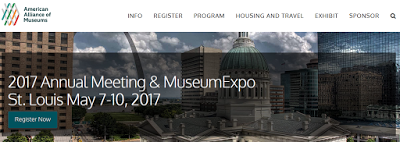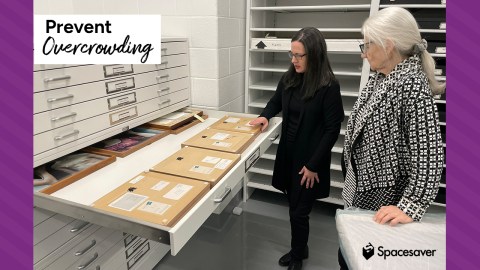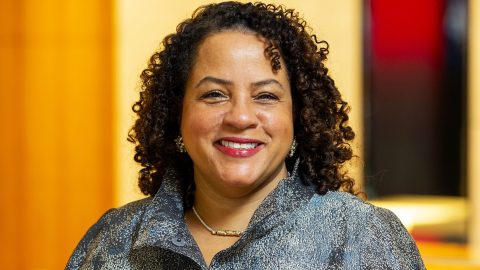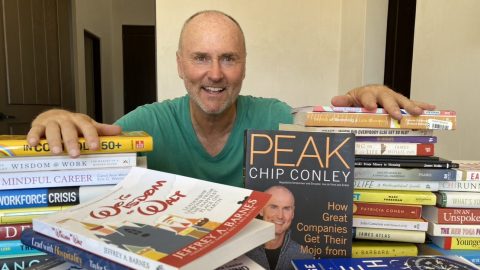
The cherry blossoms have unfurled in DC—that’s my cue to post CFM’s annual guide to futures-related sessions at the AAM annual meeting. Advance registration closes April 10, so if you haven’t signed up to join us in St. Louis May 7-10, click on over and register now.
Some people tell me they find the annual meeting kind of overwhelming—so many sessions to choose from! So many events! In this post I provide one way to navigate the plethora of offerings by suggesting one, or at most two, sessions in each slot that are related to the topics covered in CFM’s TrendsWatch reports. I prioritize the themes of the latest report—TrendsWatch 2017—which are empathy, criminal justice reform, artificial intelligence, migration and refugees, and the value of failure, but in a few instances I’ve tagged sessions related to previous editions.
This Blog will feature guest posts about some of these sessions over the coming month. I hope that will help you decide how to fill up your conference schedule, and I’m happy to share some of this great content with people who can’t join us in St. Louis.
Sunday, May 7
In addition to sessions, the schedule offers a number of case studies (a fast-paced format in which presenters spend 15 minutes sharing take-aways, followed by 15 minutes of Q&A). Two back-to-back case studies on Sunday afternoon caught my attention:
1:45 – 2:15 pm
In We’re Students Too: Teaching Incarcerated Youth, Megan Bednarz will share how the Intrepid Sea-Air-Space Museum partners with the Department of Corrections to provide enrichment programming for 16-and-17-year-old males incarcerated in the Rikers Island jail complex.
and
1:00 – 1:30 pm
Mending a Vulnerable Society via Healing Museum Experiences
Last year TrendsWatchlooked at museums as happiness engines, sharing the emerging evidence that our sector may play a major role in promoting personal wellbeing. This session presents research that addresses the psychological underpinnings of how objects, exhibitions, and museum donating promote wellbeing and healing. (Brenda Cowan, Graduate Exhibition Design – SUNY Fashion Institute of Technology; Jan Seidler Ramirez, National September 11 Memorial & Museum; Ross Laird.)
At the same time, over in the regular session track, I’ve tagged:
1:00 – 2:15 pm
The Art of Observation: Museums and Medical Professionals
This session looks at how museum-medical schools partnerships engage professionals in observing, analyzing, and communicating about works of art to develop diagnostic skills, collaboration—and empathy! (Amanda Blake, Dallas Museum of Art; Julia Langley, Georgetown University; Kathleen Hutton, Reynolda House Museum of American Art; Lorena Baines, National Gallery; moderated by Rebecca Granados, Philadelphia Museum of Art.)
2:30 – 3:45 pm
It Could Happen to You: Collecting in the Face of Tragedy
Panelists make the case that museums can play an important role in community healing in the wake of traumatic events. This panel features professionals familiar with the intricacies of collecting after tragedy, touching on political, material, community-building, and staff health concerns. As the session description says, “The only thing worse than enduring a tragedy is finding yourself unprepared to react to one.” (Amy Weinstein, National September 11 Memorial & Museum; George McDaniel, McDaniel Consulting LLC; Pam Schwartz, Orange County Regional History Center; Tamara Kennelly, Virginia Tech; moderated by Adam Ware, Orange County Regional History Center.)
4:00 – 5:15 pm
Empathy as Disruptive Innovation
Elif Gokcigdem edited a collection of essays published in 2016 as “Fostering Empathy in Museums.” This session brings together some of the authors, and others, to explore how fostering empathy might be the disruptive innovation that inspires solutions to a range of local and global challenges. (Adam Rozan, Worcester Art Museum; Emlyn Koster, North Carolina Museum of Natural Sciences; Jonathan Carfagno, Hickory Museum of Art; Ruth Shelly, Portland Children’s Museum; moderated by Elif Gokcigdem.)
Incubators, Co-working Spaces, and the Future of Museums
A small but growing number of museums operate coworking spaces and incubators—I think these models may be widely adopted in the future. This session profiles current models that have been running successfully in the United States and Australia. (Dan Koerner, Sandpit; Julia Kaganskiy, New Museum; Katrina Sedgwick, Australian Centre for the Moving Image; moderated by me, Elizabeth Merritt, American Alliance of Museums.)
Monday, May 8
8:45 – 10:00 am
Leveraging Insight with Analytics for Data Driven Decisions
Collecting, analyzing and making intelligent use of data is still an emerging practice in museums—one our field needs to master. Panelists explore how museums are using analytics to uncover connections between visitors and their experiences via onsite and digital channels, and discuss how this data can be used to create deep engagement that drives increased visitation. (Corey Timpson, Canadian Museum for Human Rights; Douglas Hegley, Minneapolis Institute of Art; Liz Hay, Te Papa Museum of New Zealand; Samir Bitar, Office of Visitor Services Smithsonian Institution; moderated by Angie Judge, Dexibit.)
Museums and Well-Being
Psychologist Carol Ryff is going to offer a social scientist’s perspective on what we know and what we need to know about relationships among the arts, cultural participation, and lifelong health and well-being. The panelists will explore how museums and scientific researchers might work together to demonstrate museums’ power to improve well-being. (Carol Ryff, University of Wisconsin; Karen Gron, Trapholt Museum of Modern Art and Design, Kolding, Denmark; Line Chayder; moderated by Rainey Tisdale.)
Get Hands-on with Virtual Reality!
Early museum adopters of virtual reality will help demystify VR, profile budget-friendly, low-tech VR projects, and provide a simple demonstration of how VR content is developed. This session also promises attendees hands-on experience with VR technology together with an exploration of its uses in programming, visitor engagement, and beyond-the-walls engagement. (Barry Joseph, American Museum of Natural History; John Durrant; Marco Castro, The Metropolitan Museum of Art; moderated by Lizzy Moriarty.)
10:30 – 11:30 am
The featured speaker for this time slot, Haben Girma, has been recognized as a White House Champion of Change, Forbes 30 under 30, and BBC Women of Africa Hero. The first Deafblind person to graduate from Harvard Law School, Haben advocates for equal access to information for people with disabilities. Because of her disability rights advocacy she has been honored by President Barack Obama, President Bill Clinton, and many others. Here is a video of a talk Haben gave on accessible design at Apple’s WWDC conference in 2016
11:45 am
At 11:45 am MuseumExpo opens. Come check out the Future of Education Road Trip booth, where you can learn about the #AAMRoadTrip CFM Fellows Sage Morgan-Hubbard and Nicole Ivy took in the Southeast early this year, and help us plan five upcoming Road Trips to other regions of the United States. Pick up a cool button and leave a business card to add your museum to the list of potential destinations!
1:30 – 2:45 pm
TrendsWatch 2017: Your Annual Glimpse of the Future. I hope you join me for this romp through the latest edition of CFM’s forecasting report! While there will, alas, be no puppy this year, I will bring my little, green, artificially intelligent dinosaur mascot. If the Wifi is good, it may even answer some questions from the audience.
The Line between Creepy and Cool: Getting Data Driven Decisions Right
It is going to be important and difficult for museums to learn to tread the line between using data to create neat, personalized experiences for our visitors and being too intrusive. The panelists in this session will examine the tension between “creepy and cool” uses of data, showing how data can improve financial performance and improve the visitor experience. (Colleen Dilenschneider, IMPACTS Research & Development; Kari Alldredge, McKinsey & Company; Sebastian Chan, Australian Centre for the Moving Image; moderated by Rob Stein, American Alliance of Museums, and Kaywin Feldman, Minneapolis Institute of Art.)
F*#L: The Other Four-Letter Word
Let’s hear it for celebrating failure! I applaud the four speakers in this session who will share their failures and confront the impact failure can have on the individual, the institution, the community served, and the museum sector writ large. They will also explore how failure can be particularly challenging for smaller, less established, institutions. (Brian Carter, 4Culture; Helen Divjak, London Transport Museum; Marion McGee, National Museum of African American History and Culture; Tara McCauley, Burke Museum of Natural History & Culture.)
3:00 – 4:00 pm
Our featured speaker in this time slot is Bryan Stevenson, founder and executive director of the Equal Justice Initiative in Montgomery, Alabama. EJI is committed to ending mass incarceration and excessive punishment in the United States, to challenging racial and economic injustice, and to protecting basic human rights for the most vulnerable people in American society. They are currently working to create a National Lynching Memorial and Museum in Montgomery. Stevenson has been honored with numerous awards including a MacArthur Foundation “Genius” prize and the ACLU’s National Medal of Liberty.
Tuesday, May 9
8:45 – 10:00 am
Mistakes Were Made 2017
This recurring session at the annual meeting was one of my inspirations for the TrendsWatch 2017 chapter that explores the need for museums, and society, to get better at failing productively. I look forward to seeing who receives the AAM Epic Failure Trophy of 2017, awarded by audience vote. (Presenter Jennifer Morgan is the 2016 Epic Failure Award Winner.) As always, this session will promote the benefits of learning from failure, while asking: Why are some so hesitant to admit their mistakes? What is the price of that silence? (Enimini Ekong, National Park Service; Jennifer Morgan, Natural History Museum of Los Angeles County; moderated by Sean Kelley, Eastern State Penitentiary Historic Site.)
10:30 – 11:45 am
Effective Altruism, Evidence-Based Giving, and Museums
This is a subject much on my mind, as I watch trends disrupting traditional philanthropy. Advocates of effective altruism (a philosophy that applies evidence and reason to determine the most effective ways to improve the world for the greatest positive impact) contend that giving money to museums is a morally dubious act. Panelists will explore why the effective altruism movement is gathering strength, potentially ominous implications for financial giving to museums, and tactics and strategies for navigating the changing philanthropic environment. (Anne Ferola, University of Pennsylvania; Laura Callanan; Putter Bert, KidsQuest Children’s Museum; moderated by Susan Wilkening, Wilkening Consulting.)
12:30 – 1:30 pm
I encourage you to catch up with PIC Green in the Alliance Resource Center in MuseumExpo during this time slot. Colleagues from PIC Green, AAM’s Professional Network committed to sharing knowledge and resources on adopting sustainability in museums, will present a flash session on current PIC Green initiatives related to divestment and ethical funding. Bring questions about how you can get more involved in greening your museum!
1:30 – 2:45 pm
Engaging Immigrant Families with Art and Technology Programs
This hands-on workshop is based on lessons learned from a long-term partnership between the Smithsonian Center for Learning and Digital Access and the Fairfax County Public School Family Literacy Program that uses art and technology projects to brings whole families to the museum while developing literacy and technology skills, building confidence, and strengthening family bonds at a crucial time in children’s lives. (Micheline Lavalle, Fairfax County Public Schools; Philippa Rappoport, Smithsonian Center for Learning and Digital Access; moderated by Blaire Toso, The Pennsylvania State University.)
Forced From Home: Immersing Audiences Into the Global Refugee Crisis
Today over 65 million people have been forced from home globally; many are refugees driven out of their countries by war, deprivation, and persecution. This session explores a multi-year interactive traveling exhibit designed to deepen public understanding of the plight of refugees and migrants. Launched by Doctors Without Borders in the fall of 2016, it recently debuted in five US cities. Panelist will discuss the exhibition, this critical global issue, its implications for the museum field, and a deeper exploration of museums’ role and responsibilities to effect change. (Michael Goldfarb; Stephen Figge; moderated by W. Richard West, Autry Museum of the American West.)
3:00 – 5:00 pm
Come find me in the Alliance Resource Center in MuseumExpo! I’d love to hear your thoughts about the issues featured in TrendsWatch 2017, and learn about how your work is helping build the future.
Wednesday, May 10
9:45 – 11:00 am
Perspectives on Open Source for Museums’ Digital Projects
The push for open data and open source software is transforming the technology industry, and the movement’s goals of community and access align closely with museums’ missions. This panel takes a hard look at why museum open-source projects often fail to succeed, and discuss topics such as the role of community and how to foster it, the importance of maintenance and maintainers, Not-Invented-Here, reputation capital, alignment issues with grant-funded projects, business models for open-source projects, and long-term sustainability. (David Newbury, Carnegie Museums of Pittsburgh; Duane Degler, Design for Context; Robert Sanderson, The J. Paul Getty Trust.)
Beyond Neutrality: Walking the Walk
AAM’s Code of Ethics states, “It is incumbent on museums to be resources for humankind and in all their activities to foster an informed appreciation of the rich and diverse world we have inherited…and to preserve that inheritance for posterity.” This session makes the case that to remain vital, museums must address the greatest threat to that inheritance: climate change. Four museum directors share how their institutions champion a safe and equitable future—from green buildings, to ethical funding and investments, to exhibits and programs that provide on-ramps for visitors to take action.
(Beka Economopoulos, The Natural History Museum; Eric Dorfman, Carnegie Museum of Natural History; Richard Piacentini, Phipps Conservatory & Botanical Gardens; Robert Janes; moderated by Elizabeth Wylie, Andalusia Farm, Home of Flannery O’Connor.)
11:15 am – 12:30 pm
Failing Forward: Prototyping, Mistakes, and What We Learned
Staff of two historic houses will share their tales from the trenches of prototyping new visitor experiences on their institutions’ sacred cow-the guided tour. They promise to dish on what they tried, what was scary, what worked, what they did when they failed, and how, eventually, they found our way to something new. They will also encourage attendees to try various prototyping tools that can help create meaningful, more inclusive experiences for many different types of visitor. (Danielle Steinmann, The Trustees of Reservations; Maura Hallisey, Harriet Beecher Stowe Center; moderated by Linda Norris, International Coalition of Sites of Conscience.)
You may have flagged your own favorite sessions already—feel free to share in the comment section, below. And remember—sessions are only one way to experience the annual meeting. Make time to for networking, exploring and just plain having fun.









